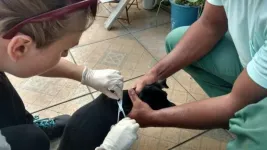(Press-News.org) Researchers from Skoltech were part of a research consortium studying a case of vertical COVID-19 transmission from mother to her unborn child that resulted in major complications in the pregnancy, premature birth and death of the child. The consortium used a Skoltech-developed proteomics method to verify the diagnosis. The paper was published in the journal Viruses.
The effects of SARS-CoV-2, the novel coronavirus, on maternal and perinatal outcomes are poorly understood due to limited data and research in pregnant women with COVID-19. There is some evidence suggesting vertical transmission from mother to fetus during pregnancy is possible, as, for instance, in China, immunoglobulin M (IgM) antibodies were found in babies born to mothers with positive SARS-CoV-2 tests.
Most known cases of COVID-19 in pregnant women have been in the third trimester of pregnancy, yet it is in the second trimester that the immune system of the mother is significantly less active. Professor Evgeny Nikolaev, Dr. Alexey Kononikhin and Dr. Alexander Brzhozovskiy of Skoltech and their colleagues in the consortium report the case of a healthy 27-year-old woman who got moderately sick with COVID-19 during the 21st week of her pregnancy.
After two weeks of illness when the patient had already tested negative for SARS-CoV-2 and had no symptoms, an ultrasound scan detected severe abnormalities with the fetus, including growth restriction and impaired blood flow in the umbilical artery. A premature boy was born via cesarean section two weeks later and died after a day and a half in NICU. The patient had no previous risk factors of severe neonatal pathology, and the pregnancy had developed normally until COVID-19.
The child tested positive for COVID-19 IgG antibodies, and a PCR test on the placenta and umbilical cord blood was positive for three SARS-CoV-2 and SARS-CoV-like genes. "The results of independent polymerase chain reaction (PCR), mass spectrometry and immunohistochemistry analyses of placenta tissue, umbilical cord blood and child blood jointly indicated vertical transmission of SARS-CoV-2 from mother to the fetus, which we conclude to be the major cause for the development of maternal vascular malperfusion in the studied case," the paper notes.
The results also present the first confirmation of SARS-CoV-2 proteins in infected placenta by proteomics and confirm the potential of mass-spectrometry approaches for detecting SARS-CoV-2 in biological fluids and tissues.
"The mass spectrometry based method of virus detection used in this study was developed at Skoltech last year. In this method, the S- and N-proteins of the virus are unambiguously detected. This approach provides 100%-selectivity for virus detection, making mass spectrometry the gold standard for COVID diagnostics. The method can be used without any modification for detection of the SARS-CoV-2 virus with any mutations," Professor Nikolaev says.
"The studied case clearly showed that transplacental transmission of SARS-CoV-2 infection is possible not only in the last trimester of pregnancy, but also in earlier stages of pregnancy. Transplacental transmission can cause the inflammation of placenta and neonatal viremia with the damage of various organs and systems," the authors conclude.
INFORMATION:
Other organizations involved in this research include the National Medical Research Center for Obstetrics, Gynecology and Perinatology, Ministry of Healthcare of the Russian Federation; Department of Obstetrics, Gynecology, Neonatology and Reproduction, First Moscow State Medical University Named after I.M. Sechenov; Moscow Institute of Physics and Technology; Jiangxi Key Laboratory for Mass Spectrometry and Instrumentation, East China University of Technology; and Emanuel Institute for Biochemical Physics, Russian Academy of Sciences.
Dogs infected with the Leishmania parasite smell more attractive to female sand flies than males, say researchers.
The study published in PLOS Pathogens is led by Professor Gordon Hamilton of Lancaster University.
In Brazil, the parasite Leishmania infantum is transmitted by the bite of infected female Lutzomyia longipalpis sand flies.
Globally over 350 million people are at risk of leishmaniasis, with up to 300,000 new cases annually. In Brazil alone there are approximately 4,500 deaths each year from the visceral form of the disease and children under 15 years old are more likely to be affected.
Leishmania parasites ...
WASHINGTON -- Even as vaccines are becoming more readily available in the U.S., protecting against the asymptomatic and pre-symptomatic spread of the virus (SARS-CoV-2) that causes COVID-19 is key to ending the pandemic, say two Georgetown infectious disease experts.
In their Perspective, " END ...
CAMBRIDGE, MA -- Much of the carbon in space is believed to exist in the form of large molecules called polycyclic aromatic hydrocarbons (PAHs). Since the 1980s, circumstantial evidence has indicated that these molecules are abundant in space, but they have not been directly observed.
Now, a team of researchers led by MIT Assistant Professor Brett McGuire has identified two distinctive PAHs in a patch of space called the Taurus Molecular Cloud (TMC-1). PAHs were believed to form efficiently only at high temperatures -- on Earth, they occur as byproducts of burning fossil fuels, and they're also found in char marks on grilled ...
One of great mysteries of human biology is how a single cell can give rise to the 37 trillion cells contained in the average body, each with its own specialized role. Researchers at Yale University and the Mayo Clinic have devised a way to recreate the earliest stages of cellular development that gives rise to such an amazing diversity of cell types.
Using skin cells harvested from two living humans, researchers in the lab of Yale's Flora Vaccarino were able to track their cellular lineage by identifying tiny variations or mutations contained within the genomes of those cells.
These "somatic" or non-inherited mutations are generated at each cell division during a human's development. The percentage of cells bearing the traces of any ...
The small intestine is ground zero for survival of animals. It is responsible for absorbing the nutrients crucial to life and it wards off toxic chemicals and life-threatening bacteria.
In a new study published March 18 in the journal Science, Yale researchers report the critical role played by the gut's immune system in these key processes. The immune system, they found, not only defends against pathogens but regulates which nutrients are taken in.
The findings may provide insights into origins of metabolic disease and malnutrition that is common in ...
93 million years ago, bizarre, winged sharks swam in the waters of the Gulf of Mexico. This newly described fossil species, called Aquilolamna milarcae, has allowed its discoverers to erect a new family. Like manta rays, these 'eagle sharks' are characterised by extremely long and thin pectoral fins reminiscent of wings. The specimen studied was 1.65 metres long and had a span of 1.90 metres.
Aquilolamna milarcae had a caudal fin with a well-developed superior lobe, typical of most pelagic sharks, such as whale sharks and tiger sharks. Thus, its anatomical features thus ...
It's not just how hot the fires burn - it's also where they burn that matters. During the recent extreme fire season in Australia, which began in 2019 and burned into 2020, millions of tons of smoke particles were released into the atmosphere. Most of those particles followed a typical pattern, settling to the ground after a day or week; yet the ones created in fires burning in one corner of the country managed to blanket the entire Southern hemisphere for months. A pair of Israeli scientists managed to track puzzling January and February 2020 spikes in a measure of particle-laden haze to those fires, and then, in a paper recently published in Science, they ...
INDIANAPOLIS -- The ongoing COVID-19 pandemic is keeping millions of Americans from their usual offices, as they find themselves still working at home. Even with the vaccine now being distributed, working from home may still be the future for some, and new research suggests the resulting work loneliness negatively impacts employee well-being. ...
Researchers who simulated early stages of the SARS-CoV-2 outbreak in Wuhan, China, conclude that the virus was likely circulating earlier than has been described, possibly even in mid-October 2019. The findings do not reveal whether the virus that first emerged was less "fit" than the virus that spread throughout China, say the authors, but the estimates do further distance the first ("index") case from the outbreak at the Huanan Seafood Wholesale Market, which has received much attention. A concerted effort has been made to determine when the SARS-CoV-2 virus ...
Have you forgotten where you laid your keys? Ever wondered where you had parked your car? Or having trouble remembering the name of the new neighbor? Unfortunately, these things seem to get worse as one gets older. A big question for researchers is where does benign forgetfulness end and true disease begin?
One of the keys to having a healthy brain at any age is having a healthy blood-brain barrier, a complex interface of blood vessels that run through the brain. Researchers reviewed more than 150 articles to look at what happens to the blood-brain barrier as we age. Their findings were published March 15 in Nature ...

